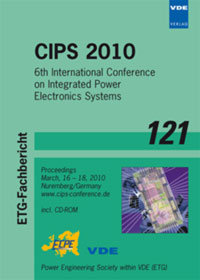Development of a Highly Compact and Efficient Solar Inverter with Silicon Carbide Transistors
Conference: CIPS 2010 - 6th International Conference on Integrated Power Electronics Systems
03/16/2010 - 03/18/2010 at Nuremberg, Germany
Proceedings: CIPS 2010
Pages: 6Language: englishTyp: PDF
Personal VDE Members are entitled to a 10% discount on this title
Authors:
Wilhelm, C.; Kranzer, D.; Burger, B. (Fraunhofer-Institute for Solar Energy Systems ISE, Heidenhofstraße 2, 79110 Freiburg, Germany)
Abstract:
As already shown in previous publications, Silicon Carbide transistors offer a great potential for reducing system costs of Photovoltaic-inverters by increasing the efficiency and decreasing the size of the heat-sink and the inductive components. The following document shows how the knowledge gained hereby now is implemented in the development of a PV-inverter optimized for the use of Silicon Carbide normally-off Junction Field Effect Transistors (JFETs). The higher efficiency results on the one hand in a gain of energy fed into the grid and on the other hand in reducing the size of the heat-sink. Furthermore, because of smaller switching energies of the SiC transistors, the switching frequency can be raised by three to nine times compared to conventional inverters, which allows reducing the size of the inductive components by almost the same factor. In this work only Silicon Carbide normally-off Junction Field Effect Transistors (JFETs) are regarded. There are also SiC-MOSFETs and SiC-BJTs available, which can be considered as an alternative. Which transistors types are the better ones depends on the application and on the power range. SiC Schottky diodes with excellent properties are available for several years and are presupposed in this work as standard for all power diodes.


